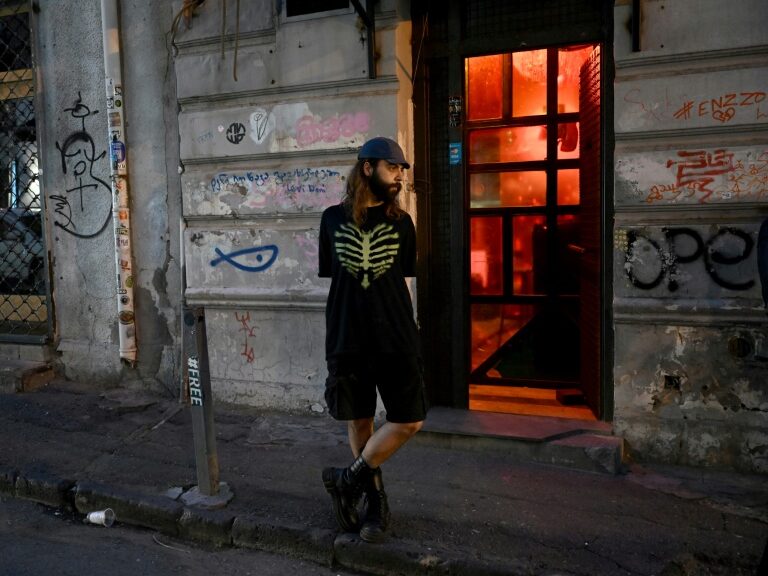LGBTQ Georgians fear Russia-style crackdown

Success was the first openly gay bar in the Caucasus when it was founded in 2000 – Copyright AFP Vano SHLAMOV
Caleb DAVIS
In Georgia’s oldest gay bar, Tato Londaridze carefully stepped around construction materials as he set out his ambitious plan to put a stage for drag queens on the dance floor.
“Success”, in the centre of the Georgian capital Tbilisi, was the first gay club in the Caucasus when it opened in 2000 — but a slew of anti-LGBTQ proposals from the government have now put its future at risk.
“We are an open gay bar,” Tato said. “And we don’t want to change that.”
On Tuesday, the ruling Georgian Dream party outlined a package of laws that would ban what it calls “LGBT propaganda”, mirroring similar legislation used to crack down on gay rights in Russia and, more recently, Hungary.
Billed as “protecting family values and minors”, the new laws would prohibit the promotion of same-sex relationships on television and in the education system, outlaw sex changes, and codify a ban on same-sex marriage and adoption.
They would also ban “gatherings and demonstrations” promoting same-sex couples, and while the laws would not target his establishment directly, Tato is worried they could have broader consequences.
“It’s not only dangerous for the gay community, it is dangerous for the owners of gay bars,” he told AFP when asked about the government’s proposals first put forward in March.
“Queer places will stop existing, queer parties will be closed,” the 29-year-old warned.
“We are looking for a solution. We don’t want to work undercover,” he sighed.
– ‘Afraid’ –
The draft legislation was announced a day after the Black Sea nation adopted a controversial “foreign influence” law placing onerous restrictions on Western-funded rights groups and the media.
Both measures have ignited fears ex-Soviet Georgia is moving back into Moscow’s orbit, despite opinion polls showing more than 80 percent of the population supporting membership of NATO and the European Union.
Londaridze said some of his friends were already planning to leave.
“Most of them are afraid. I know several people who have already bought tickets,” he told AFP.
“In the end, in Georgia, there will not be openly queer people,” he feared.
Across the street, in the small office of LGBTQ rights group Tbilisi Pride, co-founder Mariam Kvaratskhelia listed off a string of awareness campaigns and drag events they’ve been able to stage in recent years.
“It was never easy. Georgia was never a very LGBTQ-friendly country unfortunately,” the 31-year-old told AFP.
“But during the last two years, we have seen political homophobia really intensify.”
Last year, her group’s Tbilisi pride event in a park far from the city centre was mobbed by thousands of right-wing protesters, who completely destroyed the venue and forced its attendees to flee.
“The government did nothing to prevent the violence,” Kvaratskhelia said.
“I’m very sad to say this, but this year we are not planning Pride Week or any pride events.”
– ‘Existential fight’ –
With the government’s proposed laws, the LGBTQ community now faces an “existential fight”, Kvaratskhelia said.
Lawmakers have said they will consider the new bills during the current parliamentary session, ahead of October elections where the opposition hopes to form a united front.
The Speaker of Parliament Shalva Papuashvili said the sweeping package of 19 bills had the “absolute support of the country’s population” and would protect “family values”.
But opposition parties have accused the ruling Georgian Dream party of pushing through the legislation in a bid to win over conservatives and distract the population from real issues.
The bills are likely to further deepen a rift between Georgia and the EU, which warned the Caucasus country last month it was straying from its path to joining the bloc with the new Russian-style legislation.
Kvaratskhelia, whose office and apartment building have already been vandalised, said she feared the measures will further alienate LGBTQ Georgians.
“I myself have thought a lot about going abroad and having a peaceful life,” she said.
But she vowed to stay as long as it was possible.
“We are going to have huge information campaigns in Tbilisi and in the regions in order to have victory in the upcoming parliamentary elections in October,” she said.
“We are very determined to keep the fight going.”
LGBTQ Georgians fear Russia-style crackdown
#LGBTQ #Georgians #fear #Russiastyle #crackdown





